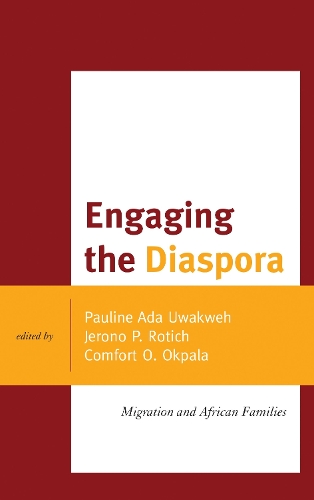
Engaging the Diaspora: Migration and African Families
(Paperback)
Publishing Details
Engaging the Diaspora: Migration and African Families
By (Author) Pauline Ada Uwakweh
Edited by Jerono P. Rotich
Edited by Comfort O. Okpala
Contributions by Ifeyinwa Mbakogu
Contributions by Amon Okpala
Contributions by Khadidja Arfi
Contributions by Michael Kremer
Contributions by Iheanyichukwu N. Osondu
Contributions by Amy Duffuor
Contributions by Shirley Mthethwa-Sommers
Bloomsbury Publishing PLC
Lexington Books
26th March 2015
United States
Classifications
Tertiary Education
Non Fiction
Ethnic studies / Ethnicity
304.808996
Physical Properties
Paperback
208
Width 151mm, Height 232mm, Spine 16mm
318g
Description
By its focus on the African immigrant family, Engaging the Diaspora: Migration and African Families carves its own niche on the migration discourse. It brings together the experiences of African immigrant families as defined by various transnational forces. As an interdisciplinary text, Engaging makes a handy reference for scholars and researchers in institutions of higher learning, as well as for community service providers working on diversity issues. It promotes knowledge about Africans in the Diaspora and the African continent through current and relevant case studies. This book enhances learning on the contemporary factors that continue to shape African migrants.
Reviews
This book is an important, timely addition to the large and growing literature on a particular area of migration studies: the experiences of Africans in the diaspora. The first part focuses on the intersecting forces that have shaped the African immigrant experience, while the second part focuses on adaptive experiences. The book's principal strength is its detailed coverage of aspects of the African immigrant experience that have received little or no attention in previous research, including parenting, spirituality, recreation, war experiences, and language. In terms of methodology, the book's interdisciplinary approach and the use of both qualitative and quantitative data contribute to the richness of the discussion. . . .Overall, the book contributes to the understanding of the variety and complexity of the African immigrant experience. An excellent resource for students of migration studies, researchers, and policy makers. Summing Up: Highly recommended. General, undergraduate, and graduate collections. * CHOICE *
The 2010 U.S. Census showed that between 2000 and 2010, the number of foreign-born Africans living in the U.S. doubled, going from almost 900,000 to 1.6 million people. For the first time, the number of Africans who have immigrated to the U.S. voluntarily has surpassed the number who immigrated involuntarily during the era of the trans-Atlantic slave trade. If for no other reasons than these, the African immigrant population in the U.S. is worthy of serious scholarly research. There are additional reasons, as well, including: the changing nature of family structures, gender roles and parenting styles; education, career mobility and earnings among first and second generation immigrants; political involvement at the local, state, national and international levels; relations among different African immigrant communities and with the African-American community; the nature of connections with families back home and with developments in the countries of origin; and, comparisons with other immigrant groups, such as South Asians. All of these issues and more are examined in Engaging the Diaspora: Migration and African Families, edited by Dr. Pauline Ada Uwakweh. Very much needed, by scholars and by immigrant families themselves, this volume will break new ground and stimulate additional research in this area. -- Beverley Grier, Associate Dean, College of Arts and Sciences, Professor of Liberal Studies, North Carolina A & T State University
Author Bio
Pauline Ada Uwakweh is assistant professor and graduate coordinator in the Department of English, North Carolina A&T State University. She has published articles on women in Research in African Literatures, African Literature Today, and Journal of the African Literature Association (JALA). Jerono P. Rotich is associate professor in the Department of Human Performance and Leisure Studies, School of Education, North Carolina A&T State University. She has published several articles and chapters in refereed journals and books, such as Journal of Negro Education, International Journal of Asian Society for Physical Education, Sports and Dance, and Journal of Black Studies. She serves on the board of directors for the Kenya Students and Scholars Association and the Association of Advancement of Educational Research (AAER). Comfort O. Okpala is professor in leadership studies, School of Education at North Carolina A&T State University. She has a variety of educational publications in refereed journals such as the Journal of Early Childhood Education, Journal of Education Finance, Journal of Educational Researcher, Urban Education, Journal of Applied Business, and Journal of Negro Education.
